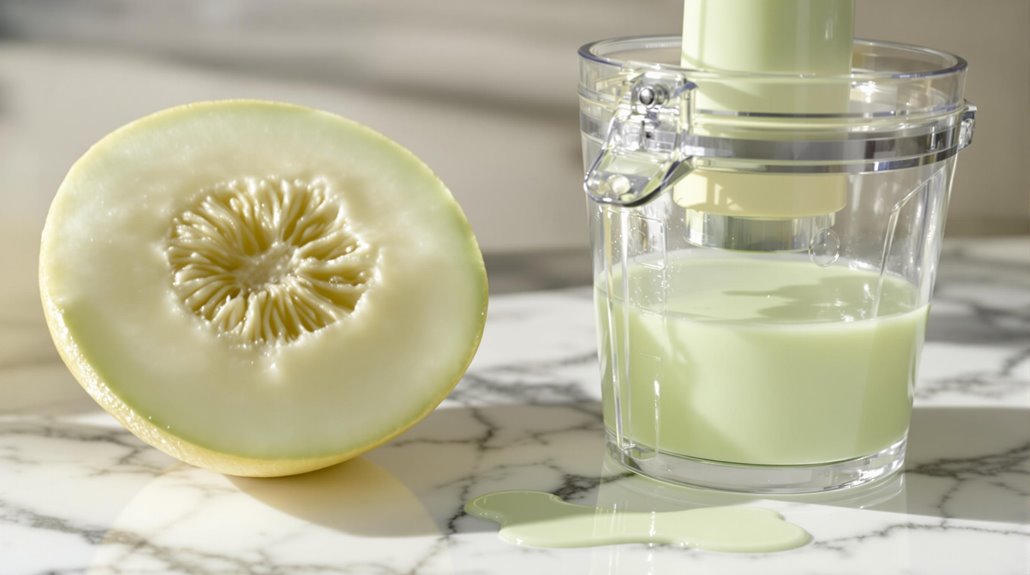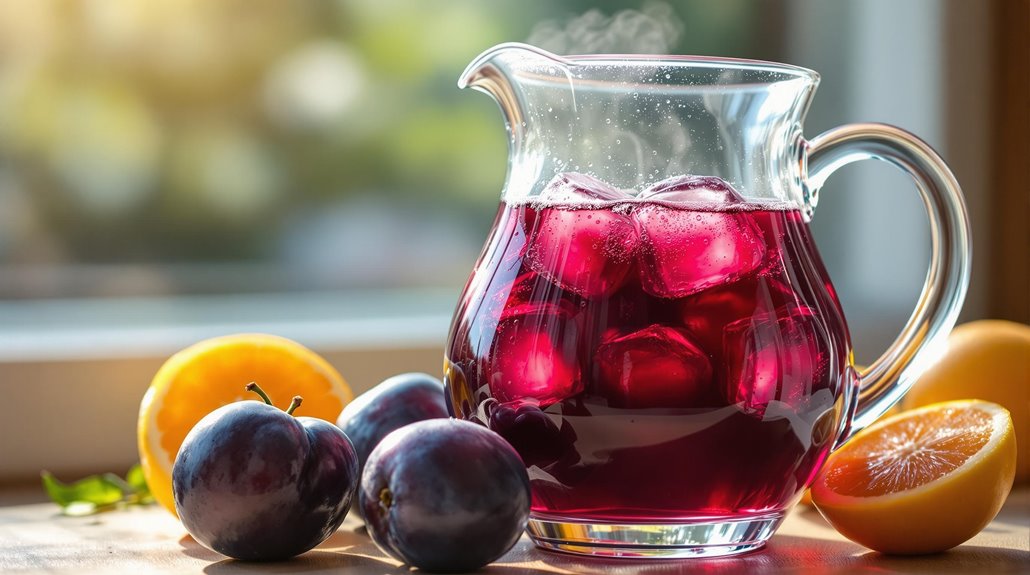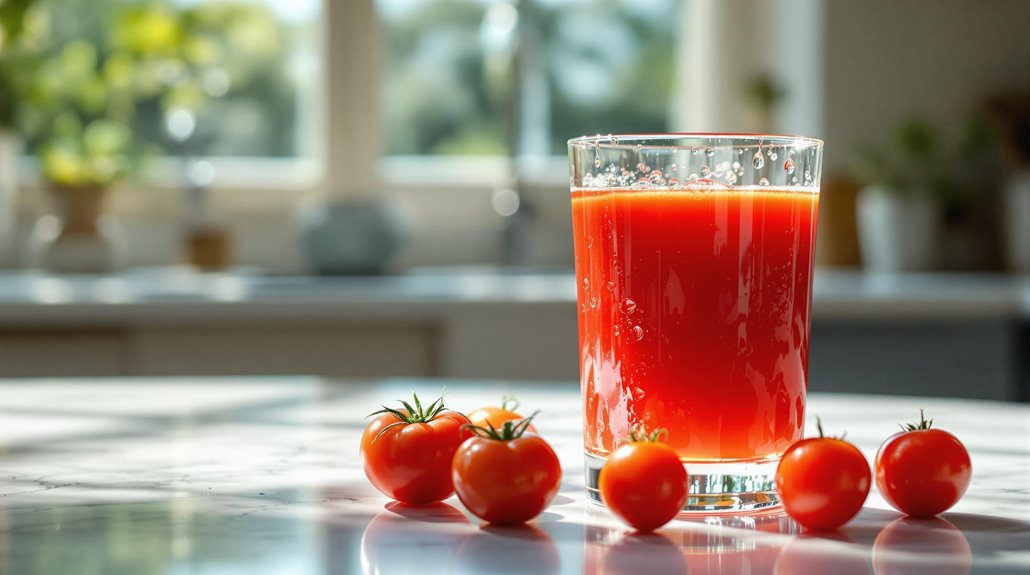Is Green Detox Good for You?
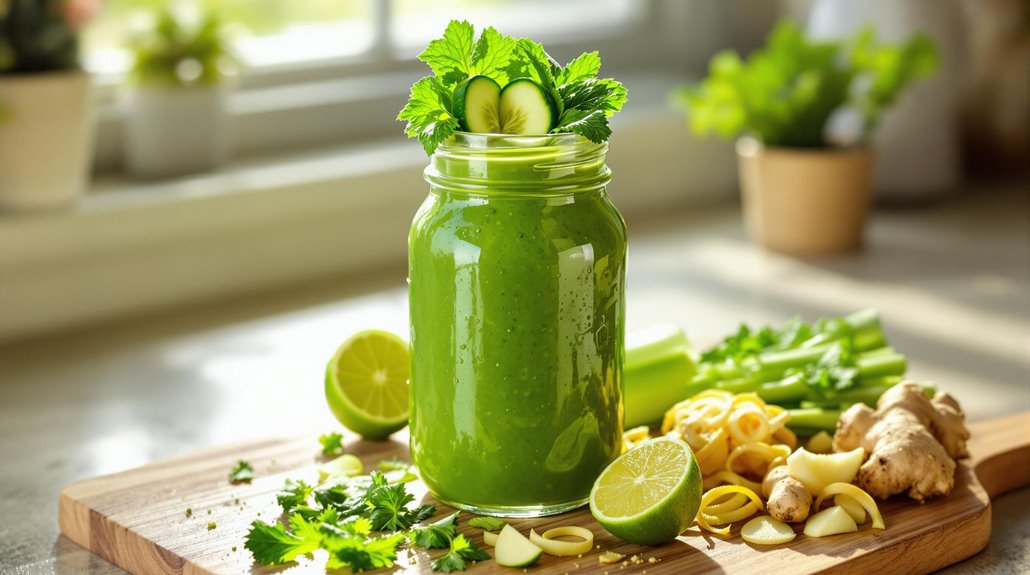
While green detox drinks can provide essential vitamins and nutrients that support your immune system and overall health, they aren't a magic solution for detoxification. You'll get beneficial compounds that fight inflammation and support gut health, but be aware that juicing removes important fiber and can spike blood sugar levels. If you have kidney issues, you'll need to be extra cautious due to high oxalate content. Understanding the full image will help you make smarter choices about green drinks.
Understanding Green Detox Drinks
While green detox drinks have gained popularity as a wellness trend, it's important to understand what they actually are and how they affect your body. These green juice beverages are made by extracting juice from vegetables like kale, spinach, and celery, creating a nutrient-dense drink that's often promoted in detox diets for toxin elimination and weight loss. During the juicing process, up to 90% fiber is removed from the fruits and vegetables, significantly reducing their digestive health benefits.
Despite claims about improving digestive health, there's limited scientific evidence supporting the detoxification benefits of these drinks. You should be aware that while they provide vitamins and minerals, they can cause blood sugar spikes due to removed fiber. If you're prone to kidney stones, the high oxalate content in some green juices may pose risks. Before starting any detox regimen, consult a healthcare professional and remember that these drinks shouldn't replace a balanced diet.
The Science Behind Green Juice Benefits
Scientific research reveals both promising benefits and potential drawbacks of green juices. You'll get essential vitamins and compounds that fight inflammation, reduce heart disease risk, and slow age-related mental decline. These juices also contain prebiotics that support beneficial gut bacteria, improving your immune function and weight management.
However, you should be aware of important trade-offs. While green juices elevate your nutrient intake, they lack fiber, which you need for heart health, blood sugar control, and digestion. If you're drinking fruit-based green juices, you might experience blood sugar spikes unless you pair them with fiber-rich foods. Additionally, the high concentration of oxalic acid from green vegetables can affect mineral absorption and potentially lead to kidney stones when consumed excessively.
Studies show that whole fruit consumption is more effective at preventing type 2 diabetes compared to drinking juices. Understanding these factors helps you make informed decisions about incorporating green juices into your diet.
Essential Nutrients and Their Role
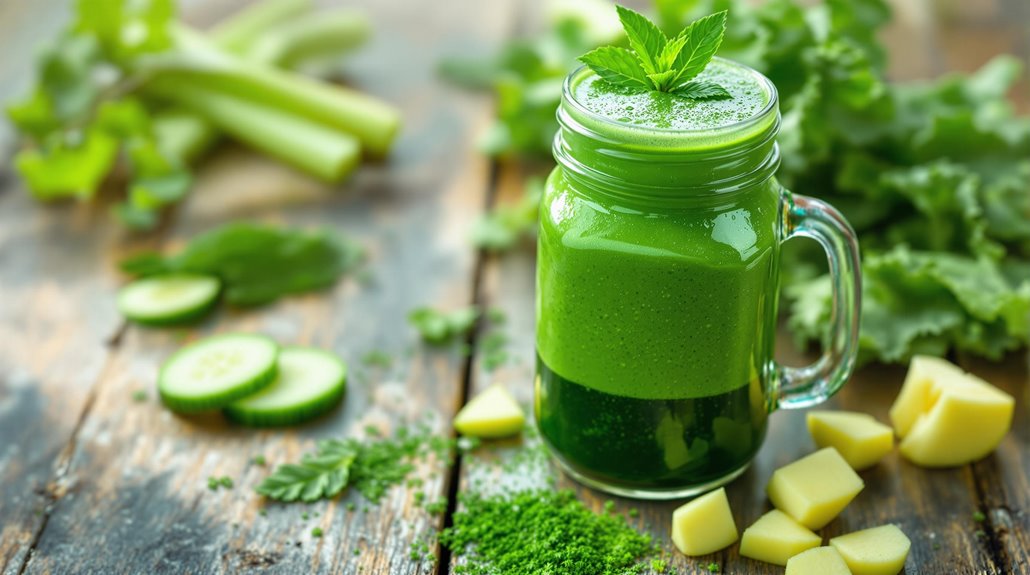
Green juices pack several essential nutrients that work together to support your body's critical functions. When you consume vegetables and fruits in juice form, you're getting a concentrated dose of vitamins and minerals that can enhance your immune function and digestive health. These nutrients are particularly beneficial when they're part of a balanced, healthy diet.
Your green juice typically contains ingredients that are rich in vitamins, especially vitamin C, which helps maintain:
- Stronger immune system response through antioxidant properties
- Better absorption of other nutrients, particularly iron from plant sources
- Enhanced skin health and collagen production
The health benefits you'll experience depend on the specific combination of ingredients in your juice. While individual components offer unique advantages, it's their synergistic effect that makes green juices particularly advantageous for overall wellness. Adding curly or Lacinato kale to your green juice provides a powerful boost of antioxidants and essential vitamins K, C, and A.
Blood Sugar Impact and Management
Understanding blood sugar management is crucial when adding juices to your diet. While green juices pack nutrients from vegetables, they can trigger blood sugar spikes, especially when they contain fruit. This happens because juicing removes most of the fiber that typically slows sugar absorption.
You can minimize these effects by pairing your green juice with fiber and protein-rich foods. If you're buying store-bought juices, check labels carefully for added sugars that could impact your blood sugar levels even more. If you have diabetes or prediabetes, it's imperative to consult your healthcare provider before making green juice part of your routine.
Remember that green juice shouldn't replace a balanced diet. Practice moderation and think of it as a supplement to your regular meals rather than a meal replacement.
Kidney Health Considerations
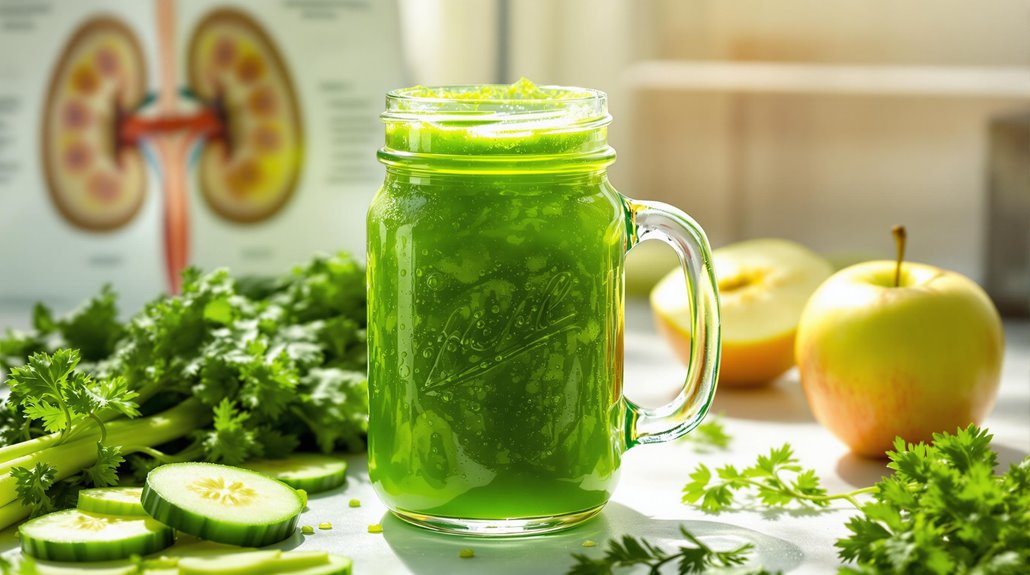
Beyond blood sugar concerns, kidney health deserves careful attention when consuming green juices regularly. While you might think green juices are purely beneficial, they're often high in oxalate, which can increase your risk of kidney stones and other kidney problems. If you have chronic kidney disease, you're particularly vulnerable to developing oxalate nephropathy from excessive green juice consumption.
Key considerations for protecting your kidney function:
- Monitor your intake carefully - even healthy individuals should avoid excessive consumption
- Watch for warning signs of kidney problems, especially if you're doing a green juice cleanse
- Consult a healthcare professional before starting regular green juice consumption, particularly if you have existing kidney issues
Oxalate buildup can lead to serious complications, including impaired kidney function and, in severe cases, kidney failure.
Best Practices for Safe Consumption
While enjoying green juice can offer numerous health benefits, following proper consumption guidelines guarantees you'll maximize its advantages while minimizing potential risks. Opt for homemade green juice instead of commercial products to avoid added sugars and plunge optimal nutrient content.
Include green juice as part of a balanced diet, maintaining moderate intake to prevent potential complications. You'll want to pair your green juice with protein, healthy fats, and fiber-rich foods to help stabilize blood sugar levels and amplify nutrient absorption.
Before starting a green juice routine, especially if you have existing health conditions, consult your healthcare professional for personalized guidance. Remember that green juice shouldn't replace whole foods but rather complement your regular diet. Focus on variety in your vegetable selection to confirm you're getting diverse nutrients.
Common Myths and Misconceptions
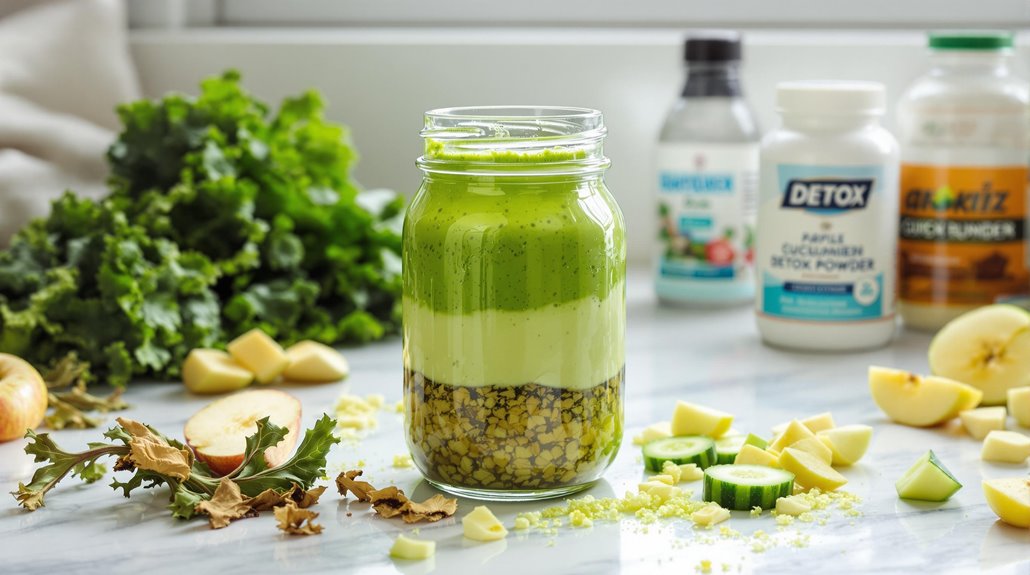
Many popular claims about green detox diets stem from clever marketing rather than scientific evidence. While you might hear promises of miraculous health benefits and rapid weight loss, the reality is quite different. Your body already has natural detoxification systems that don't require juice cleanses to function properly.
Common misconceptions about green detox diets include:
- The belief that juices can "cleanse" your blood and organs, when there's no scientific evidence supporting this claim
- The idea that weight loss from juice cleanses is sustainable, when it's mainly due to calorie restriction
- The assumption that an all-juice diet is healthy, when it can actually lead to low blood sugar and nutrient deficiencies
Instead of following restrictive detox regimens, support your health with a balanced diet rich in whole fruits and vegetables.
Alternative Nutrition Strategies
A healthier approach to wellness comes from embracing balanced nutrition instead of extreme detox diets. You'll achieve better results by focusing on a plant-based diet rich in whole foods and gradually increasing your vegetable intake. These nutrient-dense choices naturally support your body's detoxification processes while providing sustained energy.
Instead of following trendy cleanses, work with a registered dietitian to create a personalized nutrition plan that aligns with your long-term health goals. They'll help you develop a sustainable balanced diet that includes plenty of fruits, vegetables, whole grains, and lean proteins. You can enhance your body's natural cleansing abilities by staying hydrated, exercising regularly, and managing stress. These lifestyle changes offer lasting benefits that far exceed any temporary results from restrictive juice cleanses.

